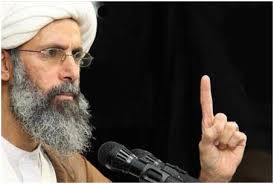 Scores of Shiite Muslims marched through the Qatif district of Saudi Arabia’s Eastern Province on Saturday in protest at the execution of a prominent Shiite cleric, an eyewitness said.
Scores of Shiite Muslims marched through the Qatif district of Saudi Arabia’s Eastern Province on Saturday in protest at the execution of a prominent Shiite cleric, an eyewitness said.
Cleric Nimr al-Nimr and three other members of Saudi Arabia’s minority sect were executed earlier alongside 43 Sunni jihadists.
The protesters chanted “down with the Al Saud”, the name of the ruling Saudi royal family, as they marched from Nimr’s home village of al-Awamiya to the region’s main town of Qatif, the only district in Saudi Arabia where Shi’ites are a majority.
Most of those executed were convicted of al Qaeda attacks in Saudi Arabia a decade ago, but four, including prominent cleric Nimr, were Shiite Muslims accused of shooting policemen during anti-government protests in recent years.
The executions took place in 12 cities in Saudi Arabia, four prisons using firing squads and the others beheading. The bodies were then hanged from gibbets in the most severe form of punishment available in the kingdom’s Sharia Islamic law.
Riyadh’s main regional rival Iran and its Shi’ite allies immediately reacted with vigorous condemnation of the execution of Nimr, and Saudi police raised security in a district where the sect is a majority in case of protests, residents said.
The executions seemed mostly aimed at discouraging Saudis from jihadism after bombings and shootings by Sunni militants in Saudi Arabia over the past year killed dozens and the Islamic State group called on followers in the kingdom to stage attacks.
The simultaneous execution of 47 people on security grounds was the biggest mass execution for such offences in Saudi Arabia since the 1980 killing of 63 jihadist rebels who seized Mecca’s Grand Mosque in 1979.
The 43 Sunni jihadists executed included several prominent al Qaeda figures, including those convicted of responsibility for attacks on Western compounds, government buildings and diplomatic missions that killed hundreds from 2003-06.
However, the execution of four Shiites, including Nimr, who were convicted of shooting and petrol bomb attacks that killed several policemen during anti-government protests in Qatif district from 2011-13, provoked an immediate response abroad.
A top Iranian cleric warned the kingdom’s Al Saud ruling family would be “wiped from the pages of history”, Yemen’s Houthi group described Nimr as a “holy warrior” and Lebanese militia Hezbollah said Riyadh had made “a grave mistake”.
Saudi police increased security in Qatif district of Eastern Province, residents said, a Shiite majority area and site of the protests from 2011-13 in which several police were shot dead as well as over 20 local demonstrators. Bahrain police fired tear gas at several dozen people protesting against the execution of Nimr, a witness said.
Sending a message
In a statement issued on state television and other official media, the Interior Ministry named the dead men and listed crimes that included both involvement in attacks and embracing jihadist ideology.
Mustafa Alani, a security analyst close to the Interior Ministry, commented: “There is a huge popular pressure on the government to punish those people. It included all the leaders of al Qaeda, all the ones responsible for shedding blood. It sends a message.”
Analysts have speculated that the execution of the four Shiites was partly to demonstrate to Saudi Arabia’s majority Sunni Muslims that the government did not differentiate between political violence committed by members of the two sects.
However, human rights groups have consistently attacked the kingdom’s judicial process as unfair, pointing to accusations that confessions have been secured under torture and that defendants in court have been denied access to lawyers.
Riyadh denies practising torture, rejects criticism of its legal process and says its judiciary is independent.
The conservative Islamic kingdom, which usually executes people by public beheading, detained thousands of militant Islamists after the 2003-06 al Qaeda attacks, and has convicted hundreds of them.
However, it also detained hundreds of members of its Shiite minority after protests from 2011-13, during which several policemen were killed in shooting and petrol bomb attacks.
Activists angry
At least three other Shiites were executed alongside Nimr, including Ali al-Rubh, who relatives said was a juvenile at the time of the crime for which he was convicted, Mohammed al-Shayoukh and Mohammed Suwaymil.
Activists in the Shiite district of Qatif have warned of possible protests in response to the executions. However, Nimr’s brother, Mohammed al-Nimr, said he hoped any response would be peaceful.
“My mobile is getting non-stop messages from friends, all shocked and angry. We know four of the names on the list. The fear is for the children among those detained,” an activist in Qatif told Reuters.
The Interior Ministry statement began with Koranic verses justifying the use of execution and state television showed footage of the aftermath of al Qaeda attacks in the last decade. Saudi Grand Mufti Sheikh Abdulaziz Al al-Sheikh appeared on television soon after to describe the executions as just.
The executions are Saudi Arabia’s first in 2016. At least 157 people were put to death last year, a big increase from the 90 people killed in 2014.
(FRANCE 24 with REUTERS)

Leave a Reply
You must be logged in to post a comment.